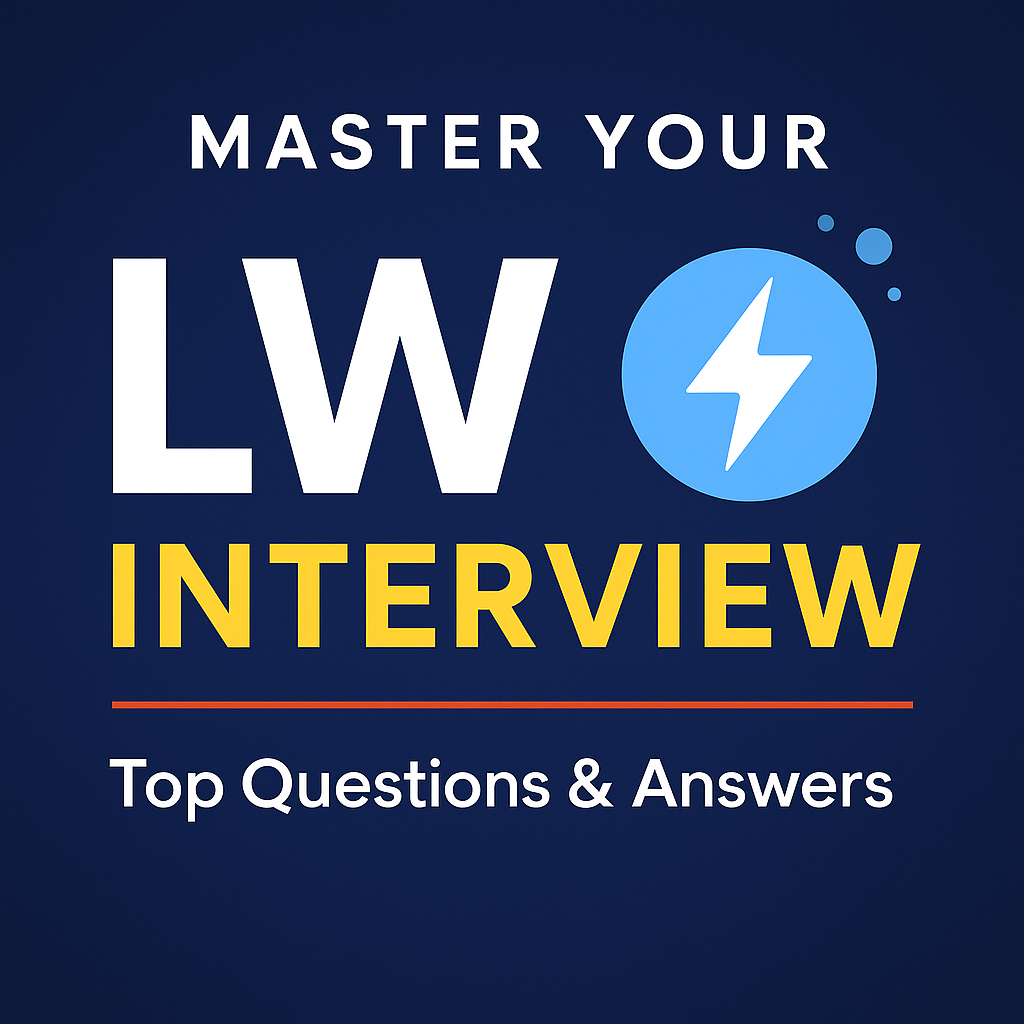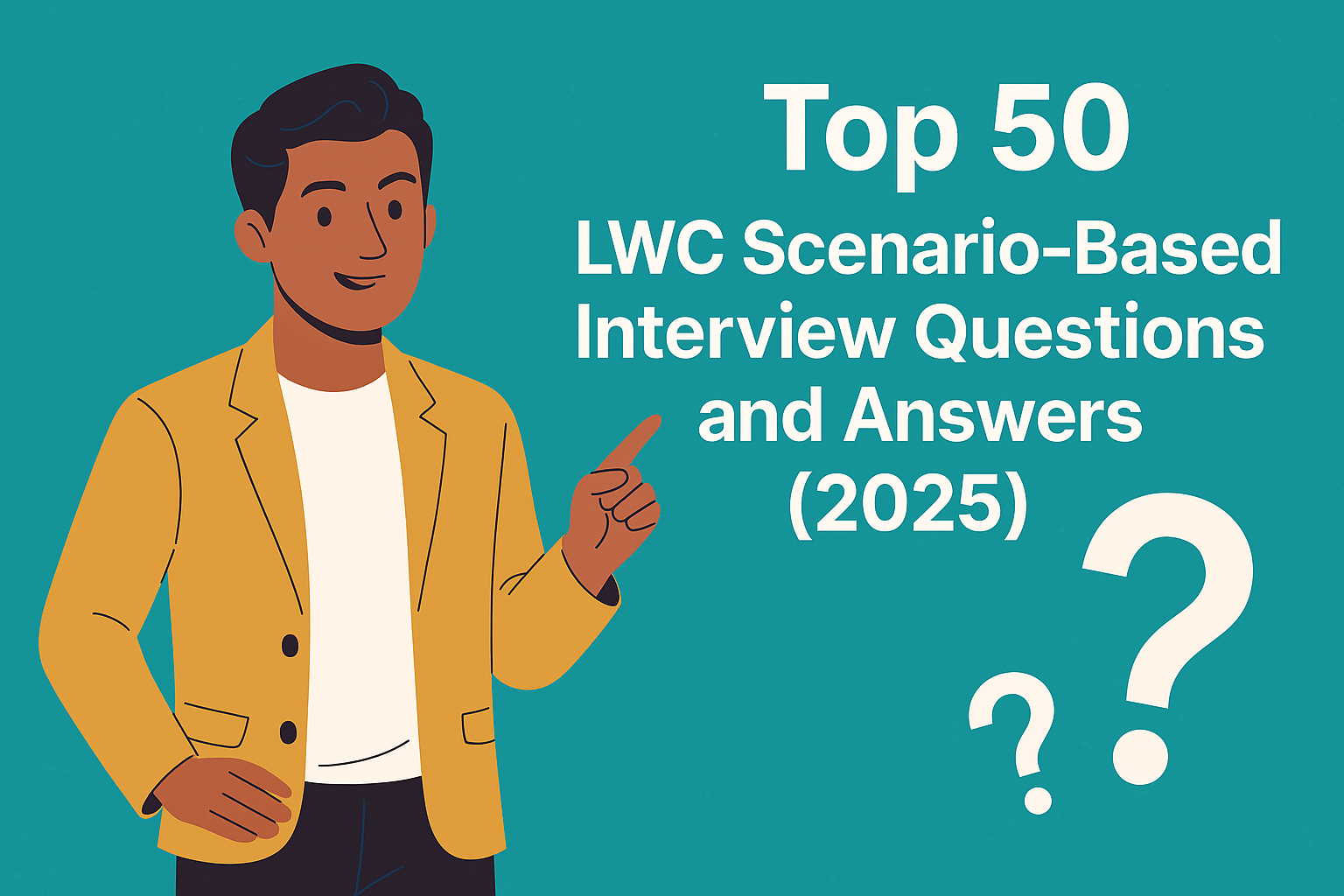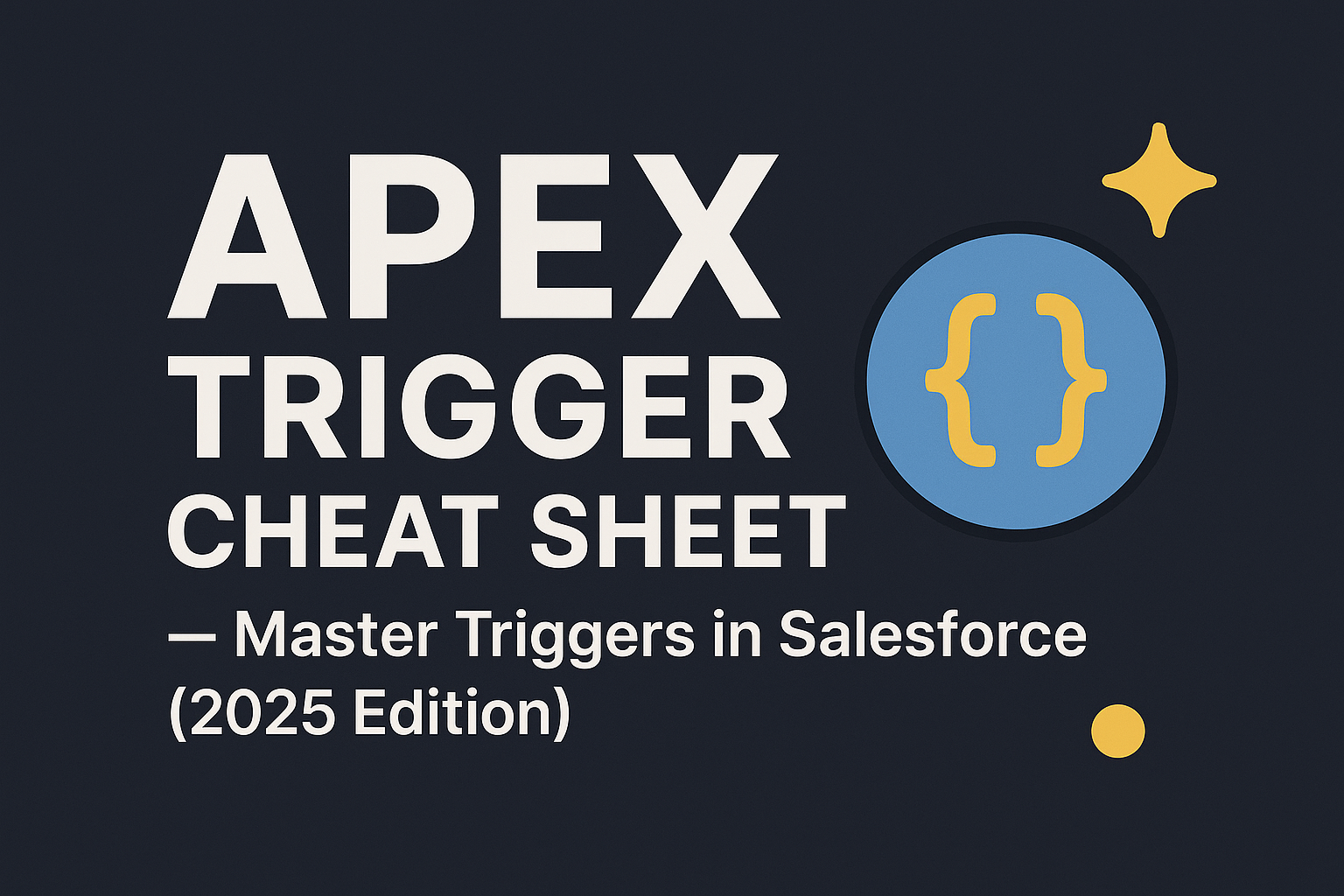If you are preparing for a Salesforce Developer interview in 2025, you need to go beyond just definitions.
Recruiters today want to know how you apply Salesforce concepts in real-world scenarios — from Apex triggers, LWC, SOQL, Flows, to Integration.
To help you crack your next interview, I’ve compiled the Top 50 frequently asked Salesforce Developer questions with short, impactful answers.
🔹 Section 1: Salesforce Basics & Admin (Q1–Q10)
Q1. What is the difference between Workflow, Process Builder, and Flow?
👉 Workflow – Limited automation (field updates, email). Deprecated.
👉 Process Builder – More powerful, but also deprecated.
👉 Flow – Future of automation, supports before/after save, callouts, subflows.
Q2. What is Governor Limits in Salesforce?
👉 Salesforce enforces limits like SOQL queries (100 per transaction), DML statements (150 per transaction), heap size, CPU time, etc., to ensure multi-tenancy.
Q3. How do you prevent recursion in a Trigger?
👉 Use a static Boolean flag in a helper class. Example:
public class TriggerHandler {
public static Boolean isFirstRun = true;
}
Q4. Difference between Role and Profile?
👉 Profile → Object/field level permissions.
👉 Role → Data visibility through hierarchy.
Q5. What are setup vs non-setup objects?
👉 Setup: User, Profile.
👉 Non-setup: Account, Contact.
👉 Mixing them in the same transaction causes Mix DML error.
Q6. What are the different types of Flows?
👉 Screen Flow, Record-Triggered Flow (Before/After), Scheduled Flow, Autolaunched Flow.
Q7. Difference between Standard and Custom Object?
👉 Standard → Predefined by Salesforce (Account, Opportunity).
👉 Custom → Created by developers.
Q8. Explain Relationship types in Salesforce.
👉 Lookup, Master-Detail, Many-to-Many (via junction object).
Q9. What is the difference between SOQL and SOSL?
👉 SOQL – Structured query on one object at a time.
👉 SOSL – Full-text search across multiple objects.
Q10. What are Governor Limit best practices?
👉 Use bulkified code, avoid SOQL/DML inside loops, use maps/sets, prefer @future/Queueable for async processing.
🔹 Section 2: Apex & Triggers (Q11–Q20)
Q11. What is a Trigger in Salesforce?
👉 Apex code that executes before/after DML operations.
Q12. How to handle bulk inserts in a Trigger?
👉 Always bulkify with Collections (List, Map, Set).
Q13. Real-time Scenario: You need to stop deleting Accounts if related Opportunities exist.
👉 Use before delete trigger with a query on Opportunity.
Q14. How do you handle recursion in Triggers?
👉 Use static variable in handler class.
Q15. Difference between before and after trigger?
👉 Before – Modify values before saving (validation, default values).
👉 After – Work with committed record (callouts, DML on related objects).
Q16. Can we call a future method from a Batch?
👉 No, but you can call Queueable from Batch.
Q17. How do you write a test class for Triggers?
👉 Create test data, insert/update records, use Test.startTest() and Test.stopTest().
Q18. What is a context variable in Triggers?
👉 Examples: Trigger.isInsert, Trigger.isUpdate, Trigger.isDelete, Trigger.new, Trigger.old.
Q19. How do you design a Trigger framework?
👉 One trigger per object → Call Handler class → Manage events separately (beforeInsert, afterUpdate).
Q20. Real-time Scenario: You have to update Contact email if related Account email changes.
👉 Use after update trigger on Account.
🔹 Section 3: SOQL & Database (Q21–Q30)
Q21. What is a SOQL Injection? How do you prevent it?
👉 Similar to SQL injection → malicious query input.
👉 Fix → Use bind variables or escapeSingleQuotes.
Q22. Difference between Relationship Query (Parent-to-Child vs Child-to-Parent)?
👉 Parent-to-Child → Subquery with relationship name.
👉 Child-to-Parent → Dot notation.
Q23. How to fetch all Accounts with related Contacts using SOQL?
👉 SELECT Id, Name, (SELECT Id, LastName FROM Contacts) FROM Account
Q24. Difference between COUNT() and COUNT_FIELD()?
👉 COUNT() → Count all rows.
👉 COUNT(Field) → Count rows where field is not null.
Q25. How do you write efficient SOQL queries?
👉 Use selective filters, avoid nested loops, use indexed fields.
Q26. Explain FOR UPDATE in SOQL.
👉 Locks records to prevent other transactions from updating.
Q27. What are Aggregate Queries?
👉 Queries with COUNT, SUM, AVG, MAX, MIN, GROUP BY, HAVING.
Q28. Real Scenario: Get number of Opportunities by StageName.
👉 SELECT StageName, COUNT(Id) FROM Opportunity GROUP BY StageName
Q29. What are Skinny Tables?
👉 Custom tables managed by Salesforce to improve query performance.
Q30. Difference between Database.insert and insert?
👉 Database.insert → Returns saveResult, can do partial insert with allOrNone=false.
👉 insert → All or none.
🔹 Section 4: Lightning Web Components (LWC) (Q31–Q40)
Q31. Difference between LWC and Aura?
👉 LWC → Web standards, better performance, reusable, less boilerplate.
👉 Aura → Legacy, slower, more code.
Q32. What are decorators in LWC?
👉 @api → Expose property to parent.
👉 @track → Reactive state.
👉 @wire → Call Salesforce data.
Q33. Parent-to-Child communication in LWC?
👉 Use @api properties.
Q34. Child-to-Parent communication in LWC?
👉 Use custom events with dispatchEvent().
Q35. Difference between @wire and imperative Apex?
👉 @wire → Reactive, cacheable, auto refresh.
👉 Imperative → Manual, dynamic, supports DML/callouts.
Q36. Real-time Scenario: You need to fetch Account list on button click.
👉 Use imperative Apex call.
Q37. How do you handle LDS in LWC?
👉 Use lightning-record-form, lightning-record-view-form, lightning-record-edit-form.
Q38. What are lifecycle hooks in LWC?
👉 connectedCallback, renderedCallback, disconnectedCallback.
Q39. How do you import Apex method in LWC?
👉 import getAccounts from '@salesforce/apex/AccountController.getAccounts';
Q40. Real-time Scenario: File Upload in LWC
👉 Use <lightning-file-upload> with Apex for metadata storage.
🔹 Section 5: Asynchronous Apex & Integrations (Q41–Q50)
Q41. Difference between Future, Batch, Queueable, and Scheduled Apex?
👉 Future → For simple async (like callouts).
👉 Batch → For large data.
👉 Queueable → Chain jobs, complex logic.
👉 Scheduled → Run at specific time.
Q42. Can we call Queueable from Batch?
👉 Yes.
Q43. Real-time Scenario: Process 5 million records. Which async to choose?
👉 Batch Apex.
Q44. How do you make a Callout from Apex?
👉 Use HttpRequest & HttpResponse. Must enable Remote Site Settings / Named Credentials.
Q45. What is Continuation in Apex?
👉 Used for long-running callouts to avoid hitting limits.
Q46. Difference between REST and SOAP integration in Salesforce?
👉 REST – Lightweight, JSON, simple.
👉 SOAP – XML, more secure, strict contract.
Q47. How to expose Salesforce data as REST API?
👉 Annotate Apex with @RestResource and @HttpGet/Post.
Q48. What are Platform Events?
👉 Pub-Sub model, used for event-driven architecture.
Q49. Real-time Scenario: Send notification when an Opportunity is Closed Won.
👉 Publish Platform Event in Apex, subscribe in LWC/Flow.
Q50. Best Practices for Integration in Salesforce?
👉 Use Named Credentials, limit callouts, handle retries, use Queueable for async.
🎯 Final Words
These 50 Salesforce Developer Interview Questions cover Admin, Apex, LWC, SOQL, Triggers, Flows, and Integration — the most frequently asked topics in 2025 interviews.
👉 Bookmark this page and practice these Q&A daily.
👉 Focus more on real-world scenarios than just definitions — because that’s what recruiters actually test.
📚 More Resources for You
Here are some resources to go deeper:
🔗 100 Scenarios (1–4 YOE)
🔗 100 Scenarios (4–8 YOE)
🔗 LWC Q&A (Real Answers Explained)
🔗 600+ Qs from Recruiter Calls
🔗 TCS, Infosys, EY Interview Qs
🔗 Salesforce Project – Hindi + English






